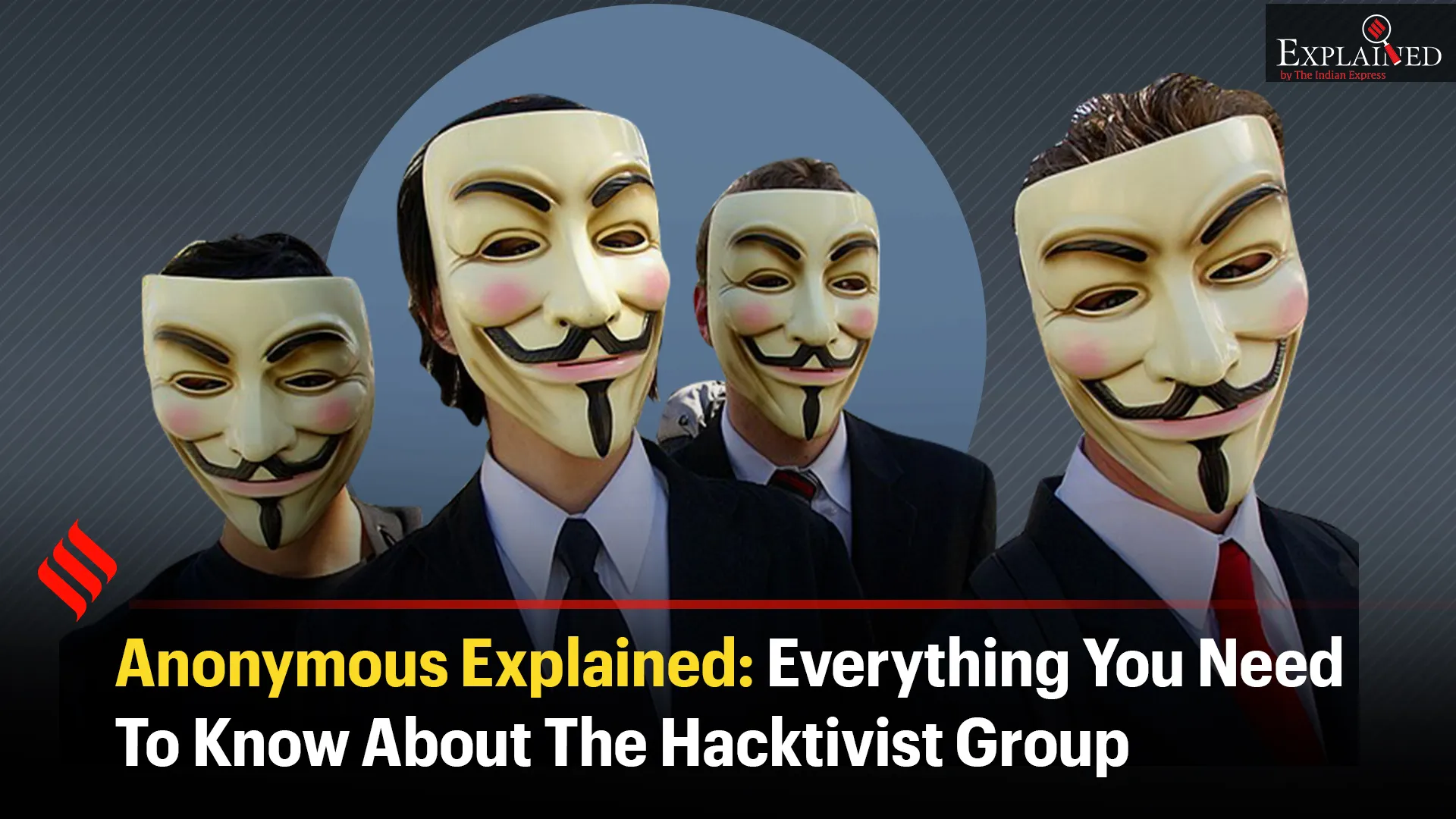There's a name that often pops up when we talk about digital disruptions and online activism, a group that has, you know, made headlines for quite some time. This collective, known as "Anonymous," operates in a rather unique way, without a central office or, like, any single leader calling the shots. They are, in a way, a movement of people who come together for various causes, often using their computer skills to get their message out there. It's a fascinating setup, honestly, when you think about it.
They've become pretty well known for their actions against different organizations, from government bodies to big companies, and even certain religious groups, as a matter of fact. Their approach involves using the internet to create a stir, aiming to bring attention to things they see as wrong or unfair. It's a method that, obviously, gets people talking and definitely makes an impact in the digital space.
So, what exactly is this "anonymous hacker group" all about? How do they work, and what drives them to do what they do? We're going to take a closer look at this collective, exploring their beginnings, their methods, and the kinds of things they've focused on over the years. It's a story that, essentially, shows how a loose collection of individuals can create a significant presence online.
- Atlantic Fish Company Boston
- Pan Foundation
- Soldier Field Chicago
- Alcovy High School
- St Louis Aquarium At Union Station Tickets
Table of Contents
- Who Are They - The Anonymous Hacker Group Explained
- What Drives the Anonymous Hacker Group?
- How Does the Anonymous Hacker Group Operate?
- The Impact of the Anonymous Hacker Group
- The Public Face of the Anonymous Hacker Group
- Origins and Evolution of the Anonymous Hacker Group
- Notable Actions by the Anonymous Hacker Group
- The Future of the Anonymous Hacker Group
Who Are They - The Anonymous Hacker Group Explained
Anonymous is, basically, a group of people who come together online, without any fixed structure or official membership, to act on shared ideas. They are a decentralized group, which means there's no single person or small group at the top telling everyone what to do, you know? It's more like a collection of individuals who choose to work together on specific projects or causes. This kind of setup makes them, in a way, quite hard to pin down.
Their activities often involve what people call "hacktivism," which is a mix of hacking and activism. They use online tools to express their views or to protest against things they disagree with. This might mean, for example, disrupting websites or making information public that they believe should be out there. It's a way for them to, sort of, make a statement using digital means.
The collective is, really, known for taking on various big targets. This includes government bodies and their different departments, large businesses, and even, as a matter of fact, the Church of Scientology. Their actions against these groups have, obviously, drawn a lot of public notice and started many conversations.
For those curious about their activities, there is, apparently, an official website that is controlled by what people call "Anonymous headquarters." This site, you know, aims to provide the latest information about what the group is doing. It's a place where you can, kind of, keep up with their public statements and reported actions.
This group uses online disruptions to support social or political ideas. They might do this, for instance, to protest censorship, to defend people's privacy, or to show instances of unfairness. Their goal is often to bring attention to these issues, hoping to create change. It's a form of digital protest, basically.
They gained a lot of public recognition for their actions against certain organizations, like Scientology and PayPal, and also, more recently, against ISIS. These actions, you know, really put them on the map and showed the kind of impact they could have. They have even, apparently, been able to help in solving crimes, which is pretty interesting.
What Drives the Anonymous Hacker Group?
Why Does the Anonymous Hacker Group Target Specific Entities?
The group's motivations are, generally, rooted in a desire to challenge what they see as corrupt or oppressive systems. They often act to expose things they believe are hidden from the public, or to fight against rules that limit freedom of expression online. So, they are, essentially, driven by a strong sense of justice, as they see it.
One of their core beliefs is, you know, opposition to internet censorship. They feel that information should be free and accessible to everyone, and they act when they perceive this freedom is being restricted. This belief, honestly, forms a big part of what moves them to act.
They also stand up for privacy, arguing that people have a right to keep their personal information safe from unwanted eyes. When they feel this right is being violated, they might take action to highlight the issue or to, sort of, push back against those they see as infringing on it. It's a commitment to individual rights, basically.
Exposing injustice is another big part of their purpose. They use their online abilities to bring attention to situations where they believe people are being treated unfairly or where wrongdoing is taking place. This can involve, for example, making certain documents public or drawing attention to specific events. They aim to, kind of, shine a light on these matters.
Their activities range from supporting social justice causes to bringing to light instances of corruption and working against governments that they consider oppressive. These acts are, obviously, meant to create a change or at least to start a conversation about these important issues. It's a broad range of concerns, to be honest.
Anonymous, in a way, seeks to create widespread public awareness and, you know, bring about a revolution against entities they see as corrupt. While doing this, they try to remain anonymous themselves, which is, apparently, a key part of their identity. This desire for mass awareness is, essentially, what fuels many of their actions.
How Does the Anonymous Hacker Group Operate?
Is There a Central Command for the Anonymous Hacker Group?
The "anonymous hacker group" formed in the early 2000s, and from the start, it emerged as a group without any official leaders or formal membership. This means that anyone who agrees with their general ideas and methods can, sort of, participate. There's no sign-up sheet or, you know, a specific meeting place.
This lack of a central command makes them, in a way, quite different from traditional organizations. Decisions are often made through loose consensus or by individuals simply choosing to act on a shared idea. It's a very fluid kind of structure, honestly, which can be both a strength and, you know, a challenge.
Their methods often involve hacking and what are called DDoS attacks, which basically flood a website with traffic to make it unavailable. These are tools they use to protest against censorship and what they see as injustice. It's a way of, kind of, disrupting the online presence of their targets.
They operate as a virtual community, meaning their interactions and planning mostly happen online. This allows people from different places to come together and work on projects without ever meeting in person. It's a truly global kind of collective, as a matter of fact.
For many, the appeal of being part of Anonymous comes from the chance to act anonymously while supporting causes related to internet freedom, human rights, and global fairness. This ability to contribute without revealing one's identity is, obviously, a big draw. It provides a certain level of protection, you know.
The Impact of the Anonymous Hacker Group
The "anonymous hacker group" has had a significant impact on what people call "hacktivism." Their actions have, apparently, shown how online activism can influence real-world events and discussions. They've certainly made a mark in this area.
This group has, you know, captured global attention for its online campaigns and activism. Their actions are often recognized by the iconic Guy Fawkes mask, which has become a symbol associated with them. This mask, essentially, represents the idea of anonymity and resistance.
Operating without a central leadership, they remain one of the more mysterious entities in the digital space. This structure makes it hard to predict their next moves or to, sort of, understand their full scope. It adds to their enigmatic quality, to be honest.
They have been operating in the digital shadows for about two decades, creating a stir and making global headlines by, you know, getting into the systems of some of the biggest companies and the most powerful governments. Their long history shows a persistent presence in the online world.
Their influence on the broader field of hacktivism is, basically, quite clear. They've inspired others and, in a way, shaped the public's perception of what online activism can be. Their methods and motivations have, obviously, become a topic of much discussion.
The group is well known for its opposition to internet censorship, its efforts to defend privacy, and its work to expose unfairness through various online actions. These core principles have, you know, guided many of their most public activities. They are, essentially, champions of digital freedom.
The Public Face of the Anonymous Hacker Group
The "anonymous hacker group" is, pretty much, recognized by the iconic Guy Fawkes mask. This image has, as a matter of fact, become a powerful symbol of their digital activism and their mysterious nature. When people see that mask, they often think of Anonymous.
In the vast online world, many different hacker groups exist, with reasons for their actions ranging from political activism to making money through cybercrime. Anonymous stands out among these for its focus on social and political causes, you know. They are, in a way, more about ideas than about personal gain.
The group is a decentralized and leaderless collection of individuals who get involved in cyber activism, often called "hacktivism." They do this to promote social justice, to support the free flow of information, and to resist systems they see as oppressive. This dedication to causes is, essentially, what defines them.
For many, the appeal of being part of Anonymous comes from the chance to act without revealing who they are, while supporting causes related to internet freedom and human rights. This ability to stay hidden, yet still make a difference, is a big part of their attraction, you know. It's a unique way to participate.
Origins and Evolution of the Anonymous Hacker Group
Anonymous began in the early 2000s, emerging from online communities as a group with no official leaders or formal membership. It was, kind of, a spontaneous coming together of people with shared interests and a desire to act. This informal start is, apparently, a key part of their story.
Over time, the group has grown and changed, adapting to new digital challenges and focusing on different issues as they arise. Their ability to evolve, you know, shows a certain flexibility in their approach. They've remained relevant for a long time, which is pretty interesting.
The provided text mentions Biella Coleman, a professor who wrote a book about the group called "Hacker, Hoaxer, Whistleblower, Spy." This book, as a matter of fact, offers a comprehensive look into their history and activities. It's a valuable resource for anyone wanting to understand them more deeply.
In the world of hacking and digital activism, few names are as well known as Anonymous. This loosely organized group of hacktivists has, you know, been in the news for more than a decade. Their longevity speaks to their lasting presence.
From taking on governments and big businesses to standing up for free expression and human rights, Anonymous has, basically, always been a symbol of digital rebellion. They represent a kind of resistance that uses online tools to make its point.
Notable Actions by the Anonymous Hacker Group
When Did the Anonymous Hacker Group Attack Russia?
The "anonymous hacker group" launched cyberattacks on Russia after its invasion of Ukraine. This action, you know, showed their willingness to get involved in major global events and take a side based on their principles. It was a significant moment for the group.
The text mentions a chronological list of Anonymous's most notable hacks, shedding light on the reasons behind them and their outcomes. These actions, you know, provide a clear picture of what the group does and what they aim to achieve. They are, essentially, a record of their public activities.
They have been known to exploit digital weaknesses to achieve their goals, which can range from financial theft to political activism. However, Anonymous, as a matter of fact, focuses more on the activism side of things. They use these methods to bring about change, rather than for personal gain.
The group has, honestly, captured global attention for its cyber campaigns and activism. Their actions have often made headlines, showing the power of a decentralized collective to create a stir on a large scale. They are, in a way, a force to be reckoned with online.
The Future of the Anonymous Hacker Group
What's Next for the Anonymous Hacker Group?
The text ends by saying that in 2025, people are wondering about the future of the "anonymous hacker group." This suggests an ongoing interest in their activities and their role in the digital world. Their story, you know, continues to unfold.
Given their history of adapting and responding to current events, it's fair to assume they will continue to be a presence in the online landscape. Their commitment to social justice and digital freedom, you know, seems to be a constant. They will, basically, likely continue to challenge what they see as wrong.
The group's decentralized nature means it can, sort of, shift its focus and regroup as needed, without a central authority to slow it down. This flexibility might be key to their continued existence and influence. It's a model that, apparently, allows for sustained action.
Their impact on cybersecurity and the broader discussion around digital rights is, honestly, undeniable. They've made people think more about issues like censorship, privacy, and the power of online collectives. They've certainly left a lasting mark.
This article has explored the origins, principles, activities, and influence of Anonymous, providing a general overview of this important hacktivist collective. We've looked at how they started, what drives them, the kinds of things they do, and the effect they've had on the digital world. The group's journey, you know, offers a lot to consider about online activism and its potential.
Related Resources:



Detail Author:
- Name : Barney Haag
- Username : jany.hahn
- Email : emerald52@oberbrunner.net
- Birthdate : 1979-01-28
- Address : 17442 Towne Gardens Apt. 934 New Alexamouth, IL 59861-6066
- Phone : +1-762-392-4708
- Company : Brown-Ryan
- Job : Construction
- Bio : Non tempora voluptas et ullam id qui. Ipsa ut fuga laudantium quasi voluptate. Voluptatem nihil eligendi sed neque non. Provident est hic corporis accusamus quo asperiores eum.
Socials
tiktok:
- url : https://tiktok.com/@lilliedickens
- username : lilliedickens
- bio : Alias eius velit voluptas voluptas.
- followers : 4676
- following : 1099
facebook:
- url : https://facebook.com/lillie.dickens
- username : lillie.dickens
- bio : Natus nisi illo esse eveniet debitis.
- followers : 1509
- following : 1886